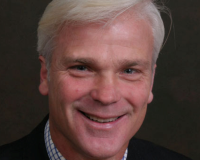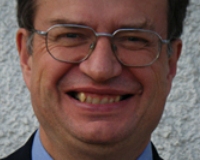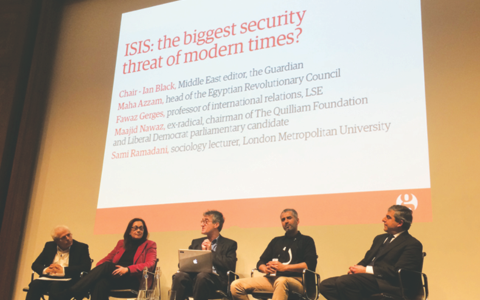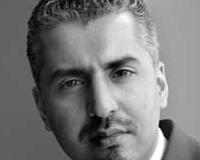DfID Minister slams BBC over its Islamist semantics
by - 28th November 2014
 THE MINISTER of State for International Development criticised the BBC this week for referring to ISIL as 'Islamic State’, arguing the term was a ‘standing insult to a billion peace-loving Muslims’.
THE MINISTER of State for International Development criticised the BBC this week for referring to ISIL as 'Islamic State’, arguing the term was a ‘standing insult to a billion peace-loving Muslims’.
Instead, the Rt Hon. Desmond Swayne MP suggests the Arabic term Daesh - a loose acronym for ‘Islamic State of Iraq and the Levant’ (al-Dawla al-Islamiya al-Iraq al-Sham).
Referring to the group as 'Islamic State' recognised the group’s claim and was therefore 'a standing insult to a billion peace-loving Muslims throughout the world,' he said.
The DfID minister made his ‘personal remarks’ at a freedom of religion event organised by Baroness Berridge in Parliament on Tuesday evening.
Mr Swayne said he agreed with the French Foreign Minister’s statement in September that 'Islamic State' ‘blurs the lines between Islam, Muslims, and Islamists…The Arabs call it "Daesh" and I will be calling them the "Daesh cut-throats".’
Persecution
The MP for New Forest West in Hampshire also used his short speech to criticise Christians who argue ‘Islam is uniquely and particularly suited to violent expression and persecution of other religions,’ saying such people were delivering ‘absolute manifest nonsense’.
The former banker who studied Theology at St Andrew's University, argued that many Christians ‘need a broader appreciation of the sweep of history’.
Referencing the Crusades, and other bloody moments in church history, Mr Swayne said: ‘I don’t think there’s anything ISIL can come up with that Christians have not matched at some stage in history…We used to burn one another over relatively trivial aspects of doctrine’, he said, adding: ‘It wasn’t until 1964 that the greater part of Christianity [the Roman Catholic Church] accepted the principle of religious freedom.’
 The leader of the Christian People’s Alliance, Sid Cordle MBE responded by saying: ‘I profoundly disagree with the history lesson you’ve given us today…There are no Christians fighting back with weapons against Islamic state so this is not a war between Islam and Christianity. This is a war Islam is fighting against non-believers.
The leader of the Christian People’s Alliance, Sid Cordle MBE responded by saying: ‘I profoundly disagree with the history lesson you’ve given us today…There are no Christians fighting back with weapons against Islamic state so this is not a war between Islam and Christianity. This is a war Islam is fighting against non-believers.
‘If you look at the Qur’an there are numerous verses where what’s happening by ISIL is justified in the Qur’an. What IS are doing at the moment is Islam, it's in the Qur’an.’
Mr Swayne responded by saying the dark moments in both Christianity and Islam’s history are ‘representative of the radical depravity of man expressed in all religions’.
‘With respect to your reading of the Qur’an I can give you any number of bloodthirsty ghastly taken-out-of-context quotes from the New and Old Testaments,' he said.
 Speaking after the event, Professor of Religious History at the Open University John Wolffe agreed it was ‘very important’ that Christian critique of ISIL acknowledged ‘appalling things done in the past in the name of Christianity.
Speaking after the event, Professor of Religious History at the Open University John Wolffe agreed it was ‘very important’ that Christian critique of ISIL acknowledged ‘appalling things done in the past in the name of Christianity.
‘Fundamental human depravity explains far more than religious impulses. It is important, however, to contrast attitudes to the state in Christianity and Islam. Christianity has often been compromised by its associations with the state but it nevertheless recognises an essential distinction between church and state.
'ISIL’s aspirations to restore the Caliphate, bringing political and religious leadership together in a manner alien to Christianity, opens the door to the unrestricted and persecuting abuse of power.’
‘Boots on the ground’ needed
Mr Swayne said boots on the ground in Iraq would be required to defeat ISIS, adding: ‘. . . but I don’t think it should be our boots.’
‘I’ve served in Iraq and one of the lessons we’ve learned is our boots might make things worse rather than better,’ he said.

Later that evening, at a Guardian Live event on ISIS, Fawaz Gerges, Professor of International Relations at London School of Economics (LSE) said not even boots on the ground would be able to defeat the terror organisation.
‘We need a bottom-up strategy as opposed to a top-down strategy. We need to deny ISIS its social basis…I take ISIS much more seriously than I take Al Qaeda because ISIS has found a social base. It has a constituency.’
Solidarity
 At the same event former radical, now anti- extremist think-tank chairman, Maajid Nawaz, said the conflict in Syria is ‘one of the most brutal civil wars of our age’ and ‘the worst jihadist-on-jihadist war we’ve ever seen.’
At the same event former radical, now anti- extremist think-tank chairman, Maajid Nawaz, said the conflict in Syria is ‘one of the most brutal civil wars of our age’ and ‘the worst jihadist-on-jihadist war we’ve ever seen.’
Nawaz, who upon taking to the stage removed his coat to display a shirt with the Arabic letter ن in a sign of solidarity with persecuted Christians, said Assad’s alleged chemical weapons attack in 2013 was a ‘missed opportunity’ for intervention.
He said it was a ‘huge mistake’ not to intervene ‘because it was at that moment the advantage swung in favour of the jihadist groups in general and ISIL in particular because people gave up on the outside world.’
The Quilliam founder said he wants to ‘provide alternative discourses and narratives to Islamism so that the ideology becomes as unattractive and unappealing as Soviet communism is today.’
